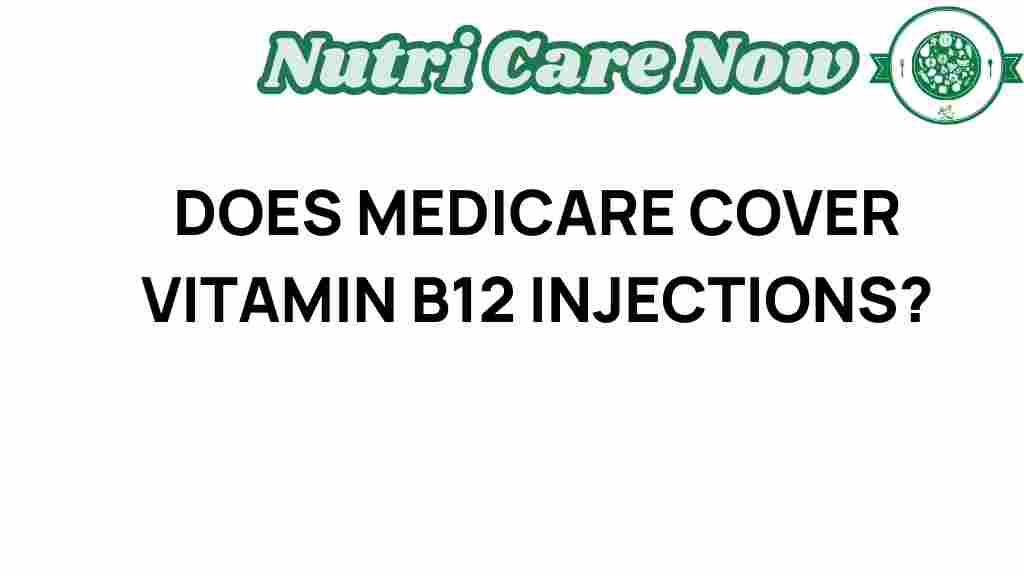Unraveling Medicare’s Coverage: Are Vitamin B12 Injections Included?
As we age, our nutritional needs change, making it essential to understand how health coverage works, particularly for the elderly. Many older adults face health challenges that might require additional medical intervention, such as Vitamin B12 injections. This article explores whether Medicare covers Vitamin B12 injections, the importance of nutrition for the elderly, and how to navigate health coverage effectively.
Understanding Medicare and Its Coverage
Medicare is a federal health insurance program designed primarily for individuals aged 65 and older, as well as certain younger people with disabilities. It provides essential health coverage, including hospital services, outpatient care, and some preventive services. However, understanding the specifics of what is covered can be confusing.
When it comes to Vitamin B12 injections, these are often necessary for individuals suffering from Vitamin B12 deficiency, which can lead to serious health issues such as anemia, neuropathy, and cognitive decline. For many elderly patients, the body’s ability to absorb Vitamin B12 diminishes, making injections a common treatment option.
What Are Vitamin B12 Injections?
Vitamin B12 injections are administered when oral supplements are insufficient for addressing a deficiency. These injections are vital for maintaining healthy nerve function, DNA synthesis, and the production of red blood cells. They are typically recommended for individuals who:
- Have pernicious anemia
- Are vegetarians or vegans who may lack B12 in their diet
- Have gastrointestinal issues that impair absorption
- Are elderly and may have a reduced ability to absorb nutrients
Does Medicare Cover Vitamin B12 Injections?
When it comes to health coverage, Medicare Part B does cover Vitamin B12 injections, but certain criteria must be met:
- The injection must be deemed medically necessary by a healthcare provider.
- The patient must have a diagnosed deficiency that cannot be corrected with oral supplements.
- Coverage may vary between different Medicare Advantage plans.
It’s essential for beneficiaries to consult with their healthcare provider and understand their specific insurance policy, as coverage can differ based on individual circumstances.
How to Access Medicare Benefits for Vitamin B12 Injections
To ensure that you can access the necessary medical benefits for Vitamin B12 injections, follow these steps:
- Consult Your Healthcare Provider: Schedule an appointment to discuss your symptoms and the need for testing. Your doctor can run blood tests to determine if you have a Vitamin B12 deficiency.
- Get a Diagnosis: If a deficiency is confirmed, your provider will document this diagnosis, which is crucial for Medicare coverage.
- Receive a Treatment Plan: Work with your doctor to create a treatment plan that may include regular Vitamin B12 injections.
- Check Medicare Coverage: Verify with Medicare or your insurance provider that the injections will be covered under your specific plan. This can usually be done through the Medicare website or by calling their customer service.
- Follow Up: Attend follow-up appointments to monitor your Vitamin B12 levels and adjust the treatment plan as necessary.
Potential Costs Involved
While Medicare does cover Vitamin B12 injections under certain circumstances, there may be costs associated with the treatment:
- Deductibles: You may need to meet your annual deductible before Medicare starts to pay.
- Coinsurance: After the deductible is met, you may be responsible for a coinsurance payment, which is typically 20% of the Medicare-approved amount.
- Additional Fees: If the injections are administered in a doctor’s office, there may be additional fees for the office visit.
Common Troubleshooting Tips
If you encounter issues with accessing your Vitamin B12 injections through Medicare, consider the following troubleshooting tips:
- Documentation: Ensure that your healthcare provider has documented your Vitamin B12 deficiency and the medical necessity of the injections.
- Contact Medicare: If you believe you should be covered, don’t hesitate to call Medicare directly for clarification.
- Appeal Denied Claims: If your claim is denied, you have the right to appeal the decision. Gather all relevant documentation and submit your appeal promptly.
- Consult a Medicare Specialist: If you are having trouble navigating your benefits, consider consulting a Medicare specialist who can provide personalized assistance.
Importance of Nutrition in Elderly Care
Nutrition plays a critical role in the health and well-being of the elderly. Adequate intake of essential vitamins and minerals is necessary to maintain physical and cognitive health. Here’s why nutrition is vital:
- Prevention of Chronic Diseases: Proper nutrition can help prevent conditions like heart disease, diabetes, and osteoporosis.
- Enhanced Immune Function: A well-balanced diet bolsters the immune system, making the elderly less susceptible to infections.
- Improved Mental Health: Certain nutrients, including Vitamin B12, are linked to cognitive health and mood regulation.
- Better Quality of Life: Good nutrition contributes to overall well-being, enabling seniors to maintain their independence longer.
Conclusion
Understanding whether Medicare covers Vitamin B12 injections is crucial for older adults facing nutritional challenges. With the right approach and knowledge about your health coverage, you can ensure access to necessary treatments that improve your quality of life. Always consult your healthcare provider about any dietary concerns and stay informed about your insurance policy to maximize your healthcare access.
For more information on Medicare coverage, you can visit the official Medicare website. If you’re interested in nutritional support for the elderly, consider exploring resources available through local health organizations.
This article is in the category Health and created by NutriCareNow Team
